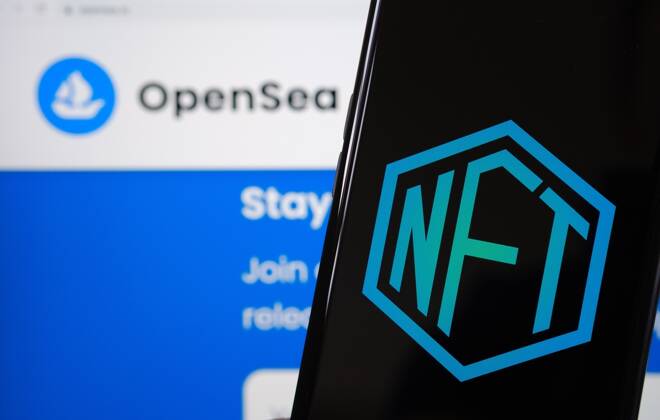Advertisement
Advertisement
OpenSea Drops Iranian and Venezuelan Users in Response to U.S. Sanctions
By:
Following OpenSea's move in Iranian and Venezuelan users accounts, pressure on crypto exchanges to impose blanket bans on Russians will intensify.
Key Insights:
- Pressure mounts on crypto exchanges to impose blanket bans on Russian account holders.
- NFT marketplace OpenSea cuts off Iranian and Venezuelan users citing U.S. sanctions.
- Blanket bans could spread beyond Russia to Russian allies.
Russia’s invasion of Ukraine extends into a 9th day today. Governments from around the world, NATO, and the United Nations have condemned the attacks. In a bid to bring a swift end to the invasion, governments have also introduced heavy sanctions on Russia.
Concerns over Russia evading sanctions with digital assets led to the Ukrainian government calling on crypto exchanges to freeze all Russian accounts. Crypto exchanges were unwilling to impose blanket bans.
OpenSea Imposes Blanket Ban as Pressure Mounts on Crypto Exchanges
Crypto exchanges intend to target Russian sanctioned entities and individuals. This week, Binance, Coinbase, and Kraken declined a request for a blanket ban on Russians. The platforms stated that they would target individuals and entities as per Russian sanctions. Binance CEO CZ even went on to say that “it would be unethical to block all Russian accounts.
Pressure on the crypto exchanges has mounted, however. This week, the White House’s National Security Council and the Treasury Department issued an order to the largest crypto exchanges. According to the report, the Biden Administration has requested that crypto exchanges “ensure that Russians do not use crypto as an escape.”
With Binance, Coinbase, and FTX in talks with the White House, exchanges may be reviewing their positions on Russian account holders. Crypto exchanges are not alone. The shift in focus to digital assets has also forced the NFT marketplace OpenSea to take action.
According to Forbes, OpenSea cut Iranian users from its platform overnight. While crypto exchanges target sanctioned individuals, OpenSea has frozen out users based on country. According to the report, an OpenSea spokesperson said: “OpenSea blocks users and territories on the U.S sanctions list from using our services.”
The decision by OpenSea to target U.S-sanctioned countries will likely place more pressure on crypto exchanges to follow suit.
Oligarchs and Russian Expats Targeted
Sanctions have had a material impact on Russian access to funds and even assets.
In recent days, Oligarchs have experienced yacht seizures and bank account freezes. These have not only impacted the Oligarchs but also Russians overseas. There are reports of Russians stranded without access to funds to cover expenses, with flight bans preventing them from returning home.
As governments take more aggressive steps to prevent Putin and his supporters from circumventing sanctions, pressure on crypto platforms will only intensify. The crypto market is already under the scrutiny of regulators and governments.
Failure to fully enforce sanctions and any news of sanction evasion via cryptos could spell “The End” for exchanges at fault. In the end, a blanket ban may end up being the best option for all concerned. The bigger question will be where a blanket ban ends. Russian allies will likely become targets should the invasion of Ukraine continue.
The U.S. government could target nations that abstained from the United Nations General Assembly resolution vote. A total of 35 members abstained, including China. Belarus, Eritrea, North Korea, and Syria voted against the resolution.
About the Author
Bob Masonauthor
With over 28 years of experience in the financial industry, Bob has worked with various global rating agencies and multinational banks. Currently he is covering currencies, commodities, alternative asset classes and global equities, focusing mostly on European and Asian markets.
Advertisement
